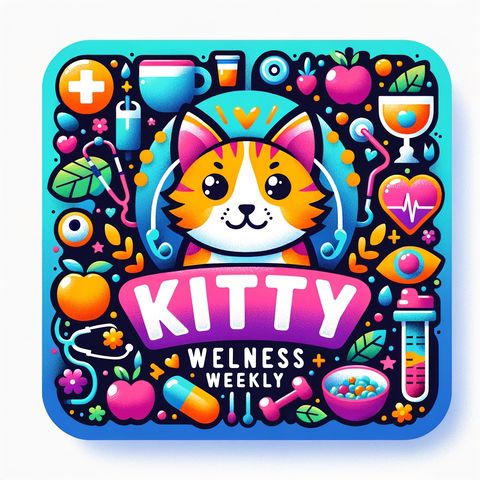Wellness for Cats: A Comprehensive Guide to Keeping Your Feline Friend Healthy and Happy

Download and listen anywhere
Download your favorite episodes and enjoy them, wherever you are! Sign up or log in now to access offline listening.
Wellness for Cats: A Comprehensive Guide to Keeping Your Feline Friend Healthy and Happy
This is an automatically generated transcript. Please note that complete accuracy is not guaranteed.
Description
Kitty Wellness Weekly is all about ensuring your feline friend leads a healthy, happy, and long life. Here’s a comprehensive guide to help you understand the importance and components of...
show more## Veterinary Exams
Regular veterinary exams are the cornerstone of kitty wellness. For kittens, monthly exams are crucial during the first few months of life, typically at 8, 12, and 16 weeks of age. These exams include vaccinations, such as FVRCP and rabies, as well as fecal screenings to check for intestinal parasites[2][4][5].
For adult cats, annual wellness exams are recommended, with twice-yearly exams advised for middle-aged, senior, and geriatric cats. These exams help in early detection of serious illnesses and ensure your cat’s overall health and wellbeing[4][5].
## Preventive Care
Preventive care is key to maintaining your cat’s health. This includes vaccinations, parasite control, and heartworm prevention. Kittens should start heartworm prevention as early as 8 weeks of age, and all cats should be tested annually for heartworm infection[2][4].
Flea and tick prevention is also vital, as these parasites can cause irritation, discomfort, and transmit diseases. Most flea and tick medications are safe for kittens from 7 to 8 weeks of age[2].
## Blood Testing and Wellness Screens
Annual blood testing is recommended for all cats to serve as a baseline for future health checks. This includes complete blood count (CBC), biochemistry profile, urinalysis, and thyroid hormone testing. These tests help in early detection and management of many disease conditions[4].
## Nutrition and Hydration
Providing a balanced and nutritious diet is essential. High-quality, brand-name cat food that includes essential amino acids like taurine is recommended. Ensure your cat always has fresh, clean water, and limit treats to no more than 5-10% of their diet[3].
## Grooming and Hygiene
Regular grooming helps keep your cat’s coat clean and reduces shedding. Brush or comb your cat frequently to prevent hairballs and maintain their overall grooming. Cats also need their nails trimmed every two to three weeks to prevent harm to humans and furniture[3].
## Spaying and Neutering
Spaying or neutering your cat by five months of age can prevent certain health issues and reduce undesirable behaviors. This procedure includes laser surgery, IV fluids, and pain management, often included in wellness plans[1].
## Wellness Plans
To make veterinary care more affordable, consider monthly wellness plans. These plans include routine check-ups, recommended vaccinations, fecal tests, and discounts on other services like flea/tick medications and dental cleanings. Plans are tailored to different life stages and needs, ensuring your cat receives the best possible care[1].
By following these guidelines, you can ensure your kitty enjoys a long, healthy life filled with joy and companionship. Regular wellness exams, preventive care, proper nutrition, and good grooming practices are all crucial components of kitty wellness. Stay vigilant, and your feline friend will thank you.
Information
| Author | QP - Daily |
| Organization | William Corbin |
| Website | - |
| Tags |
Copyright 2024 - Spreaker Inc. an iHeartMedia Company

Comments